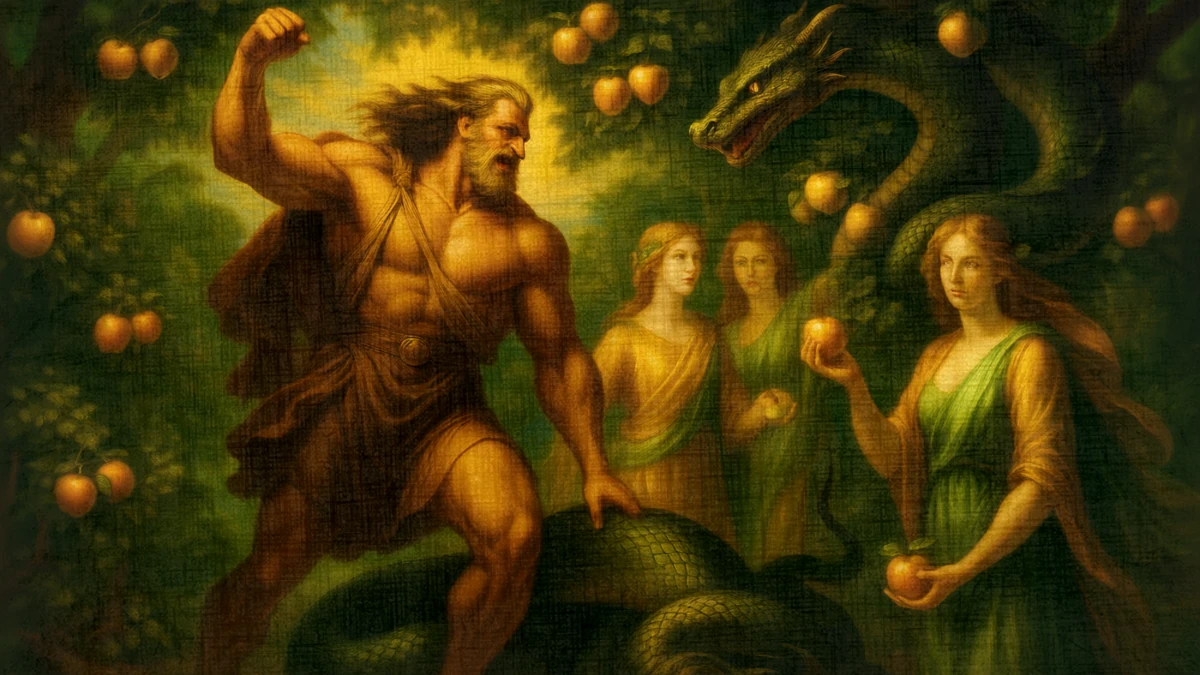Long ago, when the gods of radiant Olympus celebrated the wedding of Zeus and Hera, Gaia the Earth gifted the bride a magical tree bearing golden apples. These apples held the power to restore youth—any mortal who tasted them would never grow old.

Yet no man knew where the garden of this wondrous tree lay.
While Heracles roamed the earth, battling monsters at his king’s command, Eurystheus grew frail and cowardly in his palace. Fear gnawed at him—what if Heracles, having conquered all, ceased to obey and claimed the throne of Greece for himself? To rid himself of the hero, Eurystheus ordered him to fetch three golden apples from the tree of youth, a task surely impossible.
Heracles set out, traversing Greece from end to end. He ventured to the frigid northern land of the Hyperboreans and returned to the river Eridanus, where the nymphs, recognizing him, took pity. They advised him to seek the wisdom of Nereus, the ancient sea god who knew all hidden things.
Heracles called upon Nereus at the shore. Waves surged as playful Nereids rode dolphins to the surface, followed by the old sea god, his beard long and white. Heracles seized him, vowing not to release him until he revealed the location of Hera’s apple tree. Nereus transformed—into a fish, a serpent, fire, water, a tree, and finally a bird—but Heracles, relentless, forced him back to his true form. Defeated, Nereus confessed: the tree grew in the garden of the Hesperides, nymph-daughters of the Titan Atlas, at the world’s edge. A hundred-eyed dragon guarded it, and the path led through the Libyan desert.
Heracles demanded passage across the sea. In Libya, he trudged through scorching sands until confronted by a giant tall as a ship’s mast.
“Halt!” roared the giant. “Who dares cross my desert?”
“I seek the garden of the Hesperides,” Heracles replied.
“I am Antaeus, son of Earth. None pass without wrestling me—win, and go; lose, and join them.” He gestured to a mound of sun-bleached bones.
They grappled. Though Heracles threw Antaeus three times, the giant rose stronger each time, drawing power from his mother Earth. Realizing this, Heracles lifted Antaeus aloft, crushing him in midair where no strength could reach him.
At the world’s edge, where sky meets land, Heracles found Atlas, the Titan condemned to hold the heavens. “I need the golden apples,” said Heracles.
“The dragon never sleeps,” Atlas warned, “but the Hesperides are my daughters. Take my burden, and I’ll retrieve them.”
Heracles shouldered the sky. Atlas returned with three apples—then refused to resume his duty. “You keep the heavens,” he said. “I’ll deliver these myself.”
“Wait!” cried Heracles. “Let me pad my shoulders first.” As Atlas took back the sky, Heracles snatched the apples and fled, stars showering behind him in the Titan’s rage.
Back in Mycenae, Eurystheus, stunned by Heracles’ success, refused the apples and drove him away. On the road home, Athena appeared.
Wisdom is worth more than youth, Heracles thought—and gave her the apples. She returned them to Hera’s tree, where they belonged.